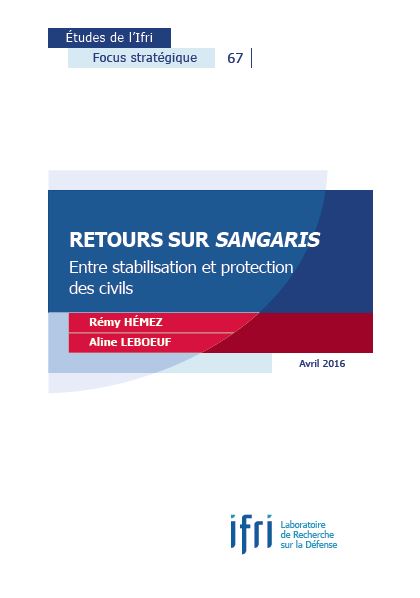Retours sur Sangaris. Entre stabilisation et protection des civils

In December 2013, France launched its operation Sangaris in the Central African Republic. What conclusions can be drawn for the stabilization of the country and the protection of civilians?
In December 2013, a decade-long political crisis in the Central African Republic descended into an aggravated civil war giving reasons to fear for mass violence along communal lines. In order to prevent further chaos, United Nations mandated France to engage in a military intervention, its seventh in this country since 1960. As a bridging operation, Sangaris aimed at setting the right conditions for the EU and UN peacekeeping missions to provide longer term security and development guidance. More than two years after its start, time has come to assess operation Sangaris’ military effectiveness in the light of the limited means it was allocated. To some extent, the operation showed how lack of resources could be offset by tactical and operational adaptations. Nevertheless, such adjustments are not risk-free and may decrease operational sustainability. The second key issue is the protection of civilians. When resources are limited, “protecting means choosing”, i.e. confronting difficult dilemmas that political and military decision-makers need to be aware of before engaging in such tasks.
This content is available in French: « Retours sur Sangaris. Entre stabilisation et protection des civils ».
Related centers and programs
Discover our other research centers and programsFind out more
Discover all our analysesMain Battle Tank: Obsolescence or Renaissance?
Since February 2022, Russian and Ukrainian forces combined have lost more than 5,000 battle tanks, a much higher volume than all the European armor combined. Spearhead of the Soviet doctrine from which the two belligerents came, tanks were deployed in large numbers from the first day and proved to be a prime target for UAVs that became more numerous and efficient over the months. The large number of UAV strike videos against tanks has also led a certain number of observers to conclude, once again, that armor is obsolete on a modern battlefield. This approach must, however, be nuanced by a deeper study of the losses and their origin, UAVs rarely being the sole origin of the loss itself, often caused by a combination of factors such as mines, artillery or other anti-tank weapons.
Mapping the MilTech War: Eight Lessons from Ukraine’s Battlefield
This report maps out the evolution of key technologies that have emerged or developed in the last 4 years of the war in Ukraine. Its goal is to derive the lessons the North Atlantic Treaty Organization (NATO) could learn to strengthen its defensive capabilities and prepare for modern war, which is large-scale and conventional in nature.
"Iron Swords" A Military Analysis of Israel's War in Gaza
On October 7, 2023, Hamas' attack, dubbed “Al-Aqsa Flood,” caused a major shock and led Israel to launch the longest war in its history. Operation “Iron Swords” was notable for its unprecedented intensity, both in terms of the massive ground forces deployed and the firepower used.
Saudi Arabia’s Nuclear Temptations. Lessons Learned from Regional Instability
Saudi Arabia’s integration in the international arena and regional stability, notably through reducing its dependence on fossil energies, are crucial elements for the success of the Kingdom’s Vision 2030, the Crown Prince’s top priority. However, Mohammed bin Salman’s declarations in 2018 and 2021, indicating that “if Iran develops a nuclear bomb, we will follow suit as soon as possible”, combined with the recent strikes on key Iranian nuclear facilities, do not bode well for the future of the Kingdom, the region and the non-proliferation regime at large.















